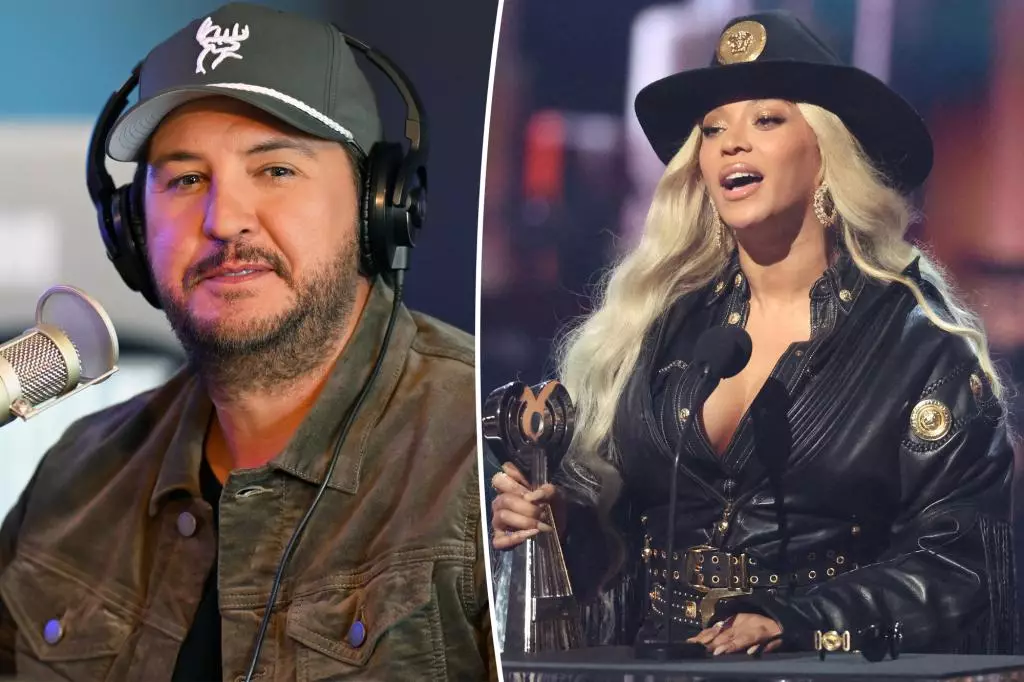The intersection of different musical genres has been a prevalent discussion point in the industry, particularly within the realm of country music. Country has long been celebrated for its rich heritage and cultural narratives, yet it also faces challenges when artists from outside its traditional boundaries seek to be a part of it. Luke Bryan recently weighed in on the conversation surrounding Beyoncé’s debut country album, “Cowboy Carter,” and the lack of nominations at the Country Music Association (CMA) Awards. His comments reveal the complexities at play within the genre and highlight the delicate dance between artistic expression and community acceptance.
Beyoncé’s foray into country through “Cowboy Carter” is notable for its commercial success, topping charts and garnering attention. However, Bryan’s remarks signal an underlying tension that often arises when acclaimed artists from different genres attempt to integrate into country music. He suggests that while everyone welcomes diverse influences in the genre, there’s an expectation for artists to engage with the country music community on a more personal level. This idea of “family” is integral to country music, but it begs the question: What counts as belonging to a musical lineage?
The Importance of Community in Country Music
Bryan’s emphasis on community as a cornerstone of country music reflects a sentiment shared by many within the genre. He asserts that simply creating a country album is not adequate for gaining recognition within the community, citing the necessary involvement in the culture surrounding it. This sentiment can be interpreted as both an invitation and a challenge. While it opens the door for collaboration, it binds the artist to expectations that may not align with their artistic integrity or personal identity.
Dolly Parton, an artist harmoniously intertwined with country music, echoed Bryan’s perspective. During a recent interview, she noted the wealth of talent within the genre that could potentially be overshadowed by a high-profile release like Beyoncé’s. Parton suggests that the CMA voting committee’s decisions are based not out of exclusion but rather out of a commitment to recognizing artists whose careers have been dedicated to the genre. This implies a gatekeeping quality that reinforces the idea that longevity and commitment to country music are prerequisites for acknowledgment.
Kelly Clarkson, another prominent pop superstar, shared her experiences navigating the country music landscape, revealing the difficulties of breaking into a genre steeped in tradition. Her candid admission of being pressured to abandon her pop roots in favor of country music illustrates the broader struggles faced by artists attempting to transition between genres. Clarkson’s experience is not an anomaly; many artists confront barriers as they navigate established musical worlds that often resist change.
Beyoncé herself has addressed the challenges she has faced as a crossover artist, highlighting her motivation to create “Cowboy Carter” from a place of adversity. Her reflections showcase the intricate relationship between personal experiences and artistic output. Beyoncé’s intention to broaden her creative horizons by integrating various genres—including country—adds a layer of complexity to discussions about authenticity and acceptance within a genre historically seen as insular.
As the conversation continues, it is crucial to examine how the country music community can foster inclusivity while remaining true to its roots. The current dialogue surrounding Beyoncé’s contributions has exposed a critical juncture for forgiveness and growth within the genre. Artists should have the freedom to explore diverse influences, and that exploration should be met with curiosity rather than skepticism.
The CMA Awards serve as a microcosm for the larger issues of recognition and affirmation in the music industry. Creating space for artists from varied backgrounds encourages growth and innovation, ultimately enriching the genre. As listeners, fans, and creators, we must question what “country” truly means in a continually evolving musical landscape and advocate for a more welcoming environment that appreciates the multifaceted nature of artistry.
The discussion surrounding Beyoncé’s contributions to country music encapsulates a larger narrative about genre boundaries and community belonging. As musicians continue to redefine these boundaries, it is vital to maintain an open dialogue that celebrates diversity while embracing the core values that define country music.

